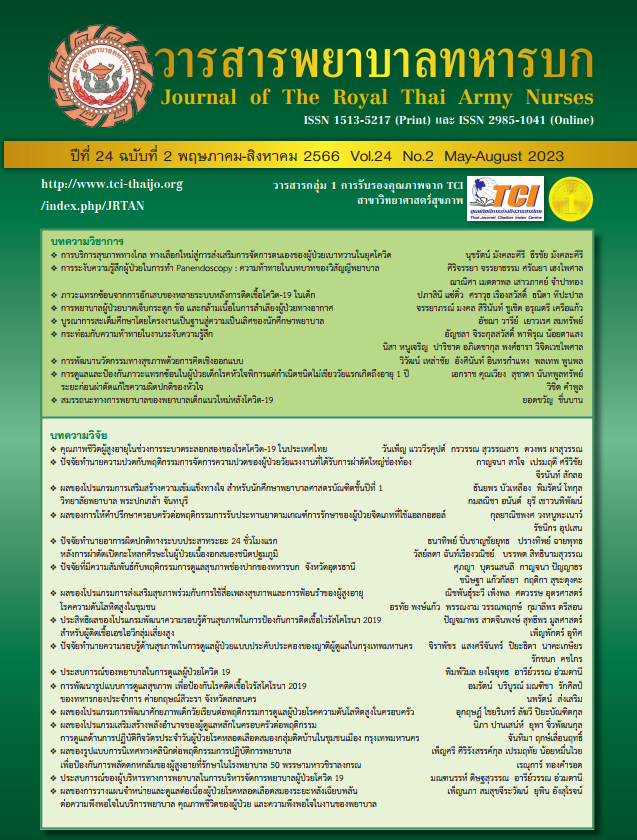The Effects of A Cognitive-Behavioral Therapy Program in Conjunction with Social Support on the Social Functioning and Mental Health of Patients with Comorbid Amphetamine Dependence and Psychotic Disorders in a Treatment Center in Pathumthani Province.
Keywords:
cognitive-behavioral therapy, social support, social functioning, mental health, comorbidAbstract
This quasi-experimental study aimed to determine the effectiveness of a cognitive-behavioral therapy program in conjunction with social support on the social functioning and mental health of patients with comorbid amphetamine dependence and psychotic disorders. The seventy-five samples had comorbid amphetamine dependence and psychotic disorders undergoing rehabilitation at a treatment center in Pathum Thani Province,
Thailand. The samples were randomized evenly into experimental and control groups. Thirty-eight samples in the experimental group received eleven sessions of the cognitive and behavioral therapy program in conjunction with social support and standard care. The thirty-seven samples in the control group received standard care. Data were collected before and a week after the trial, using questionnaires that evaluated the patients’ social function and mental health (DASS-21). Personal information forms were used to collect the data. The participant’s social functioning and mental health status scores were measured using questionnaires that evaluated the patients’ social function and mental health (DASS-21) before and after the cognitive and behavioral therapy program in conjunction with social support. Descriptive statistics were used to represent the personal information about the participants; a dependent t-test was used to compare the mean of the social functioning and mental health status scores before and after the intervention in each group; and MANOVA was used to examine the mean differences social functioning and mental health status scores between the experimental and control groups.
The results showed that after the trial, the mean scores for the social functioning of the experimental group were statistically higher than before the trial and for those of the control group (p<.001). Additionally, the mean scores for mental health related to the depression, anxiety, and stress of the experimental group were significantly lower than before the trial and for those of the control group (p< .001).
Downloads
References
Department of Mental Health. Department of mental health annual report 2019. Nonthaburi. 2019. (in Thai)
Kotchaporn, P., Nutchanart, B. & Chomchuen, S. The effects of an empowerment program on the self-control of amphetamine use disorder patients. Journal of The Royal Thai Army Nurses. 2018; 19(Supplement): 118-28. (in Thai).
National Institute on Drug Abuse (NIDA). Principles of drug addiction treatment: a research-based guide (3rded). National Institute on Drug Abuse: U.S.; 2018.
Lazarus,R.S. & Folkman,S. Stress, appraisal and coping. New York: Springer; 1984.
Amawasee, K., Nidtaya, T. & Tawanchai, J. The effect of a motivational interviewing together with cognitive behavioral therapy program on the adherence behaviors of amphetamine dependent patients in a treatment center in pathum thani province. Journal of The Department of Medical Services. 2018; 43(1): 90-5. (in Thai).
Sukuma, S., Sumnao, N., Wanpen, J., Suwapat, K., Yada, J., & Tunya, S. The effect of cognitive behavior therapy on relapse prevention of methamphetamine dependence among in-patients. Thai journal of addiction. 2016; 4(1): 1-16. (in Thai).
Kanlaya, T., Nutchanart, B. & Chomchuen, S. The effect of a cognitive-behavioral therapy program on the aggressive behaviors among delinquent adolescents in observation and protection center. Journal of The Royal Thai Army Nurses. 2020; 21(3): 262-74. (in Thai).
House,J.S., James, M. LaRocco, & John, R. P. French. Social support occupational stress and health. Journal of Health and Social Behavior. 1981; 21: 202-18.
Beck, A.; et al. Cognitive therapy of substance abuse. USA: Guilford; 1993.
Wallapa, K., Nutchanart, B. & Sararud, V. The effect of a cognitive behavioral therapy program on the depression among abused adolescent. Journal of The Royal Thai Army Nurses. 2020; 21(1): 329-37. (in Thai).
De Giorgi R, Cassar C, Loreto D’alo G, CiabattiniII M, Minozzi S, Economou A, et al. Psychosocial interventions in stimulant use disorders: a systematic review and qualitative synthesis of randomized controlled trials. Riv Psichiatr. 2018; 53(5): 233-55.
Harada, T., Tsutomi, H., Mori, R & B Wilson, D. Cognitive behavioural treatment for amphetamine type stimulants (ATS) use disorders. Campbell Collaboration. 2019; 15: 1-19.
Princess Mother National Institute on Drug Abuse Treatment. Community Therapy Rehabilitation Therapy Standards and FAST model. Pathumtani: TU print; 2015. (in Thai).
Faul, F. G*Power Version 3.1.9.2. Germany: University of Kiel; 2014.
Jantira, M., Nidtaya, T. & & Sararud, V. The effects of a cognitive-behavioral therapy program on the depression and impulsivity among adolescents in juvenile training centers in bangkok and vicinity areas. Journal of Nursing and healthcare. 2018; 36(1): 154-63. (in Thai).
Nuttorn, T., Thanvaruj, B., & Sirirat, U. Book series: Happy…Study. Nonthaburi: Parbpim; 2016. (in Thai).
Sawang, S., Goh, YW., Oei, TP., & Mukhtar, F. Using the depression anxiety stress scale 21 (DASS-21) across cultures. International Journal of Psychology. 2013; 48: 1018-29.
Paitoon, S., Jularat, W., Somsri, K., & Rossukon C. Development the functional ability assessment tool for chronic schizophrenic. journal of mental health of Thailand. 2015; 24(3): 189-201. (in Thai).
Solomonov, N., Bress, J. N., Sirey, J. A., Gunning, F. M., Flückiger, C., Raue, P. J., Areán, P. A., & Alexopoulos, G. S. Engagement in Socially and Interpersonally Rewarding Activities as a Predictor of Outcome in “Engage” Behavioral Activation Therapy for Late-Life Depression. The American journal of geriatric psychiatry: official journal of the American Association for Geriatric Psychiatry 2019; 27(6): 571–78.
Downloads
Published
How to Cite
Issue
Section
License
Copyright (c) 2023 Journal of The Royal Thai Army Nurses

This work is licensed under a Creative Commons Attribution-NonCommercial-NoDerivatives 4.0 International License.
บทความหรือข้อคิดเห็นใดใดที่ปรากฏในวารสารพยาบาลทหารบกเป็นวรรณกรรมของผู้เขียน ซึ่งบรรณาธิการหรือสมาคมพยาบาลทหารบก ไม่จำเป็นต้องเห็นด้วย
บทความที่ได้รับการตีพิมพ์เป็นลิขสิทธิ์ของวารสารพยาบาลทหารบก
The ideas and opinions expressed in the Journal of The Royal Thai Army Nurses are those of the authors and not necessarily those
of the editor or Royal Thai Army Nurses Association.






